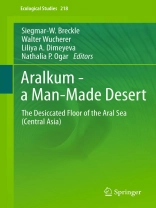Having been the fourth largest lake on the globe roughly 50 years ago, today the Aral Sea no longer exists. Human activities caused its desiccation and the formation of a huge new desert, the Aralkum, which can be regarded as one of the greatest ecological catastrophes and – at the same time – the largest primary succession experiment of mankind.
This volume brings together the results of international and interdisciplinary long-term studies on the new desert ecosystem and is divided into four main sections. The first section provides an overview of the physical characteristics of the area and covers geological, pedological, geomorphological and climatological aspects and their dynamics, especially dust-storm dynamics. The second focuses on the biotic aspects and highlights the spatial and temporal patterns of the flora and fauna. In the third section studies and projects aiming to combat desertification by phytomelioration and to develop strategies for the conservation of biodiversity are presented. The book is rounded off with a section providing a synthesis and conclusions.
Jadual kandungan
General Introduction.- Dynamics of the Aral Sea Area in Geological and Historical Times.- Geography, Geomorphological and Lithological Characteristics of the Aralkum Desert.- Climatic Conditions at the Aralkum.- Duststorms and Aerosol Long-Distance Transport.- Landscape Dynamics in the Southern Aralkum desert – Using MODIS Time Series for Land Cover Change Analysis.- Dynamics of Dust Transfer from the Desiccated Aral Sea Bottom Analyzed by Remote Sensing.- Flora of the Aralkum.- Vegetation of the Aralkum.- Primary Succession in the Aralkum.- Fauna of the Aralkum.- alophytes and Salt Desertification in the Aralkum Area.- Spatial Distribution of Plant Functional Types along Stress Gradients – a Simulation Study Orientated towards the Plant Succession on the Desiccating Aral Sea Floor.- Nature Conservation in the Aral Sea Region (Barsa Kelmes as an Example).- Phytomelioration in the Northern Aralkum.- Phytomelioration in the Southern Aralkum.- Phytomelioration of Solonchaks in the Uzbek Pre-Aral Region under Recent Climate Change.- The Aralkum Situation under Climate Change related to its Broader Regional Context.- Final Conclusions and Comments.












